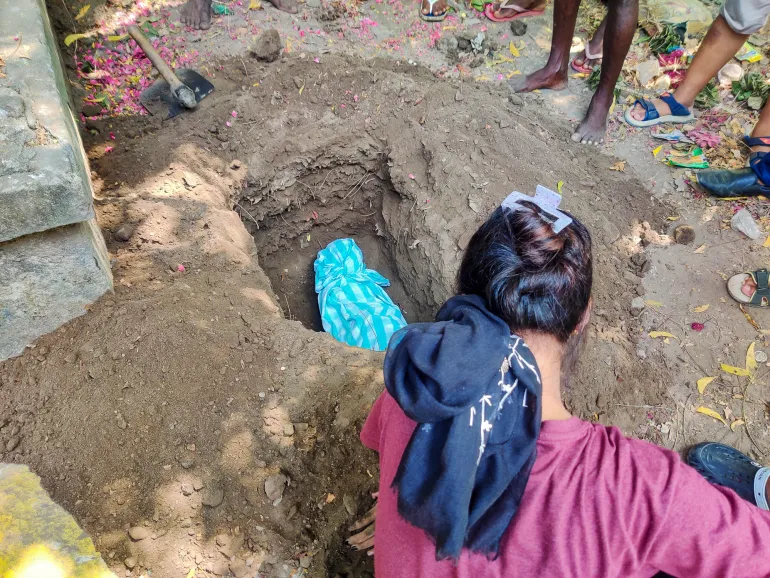Lingneifel Vaiphei crumpled to the ground in anguish upon seeing her infant son’s lifeless body laid on a cold steel stretcher in a mortuary in Chennai, the capital of India’s southern Tamil Nadu state.
Wrapped tightly in a striped woollen shawl, typical of the Kuki-Zo tribe from northeastern Manipur state, six-month-old Steven’s face had turned blue. Overcome with grief, the 20-year-old mother tearfully kissed her child’s face while her husband, Kennedy Vaiphei, stood by her side. With heavy hearts, the family proceeded to an adjacent burial ground, about 7km (4 miles) away, to lay their only child to rest. This tragedy unfolded just nine months after Lingneifel and Kennedy had relocated to Chennai in hopes of escaping violence and starting anew.
Less than a day earlier, on the night of April 25, the couple had rushed Steven to Chennai’s Kilpauk Medical Hospital as his fever persisted and worsened over the course of a week. Tragically, the infant passed away en route to the hospital, cradled in his mother’s arms, before they could reach medical assistance.
A year of deadly violence
Born in Chennai last winter, Steven’s birthplace lies nearly 3,200km (1,988 miles) away from his parents’ homeland in Manipur, which has been engulfed in deadly ethnic clashes between the predominantly Hindu Meitei and the primarily Christian Kuki-Zo tribes for the past year.
Manipur’s population of 2.9 million is comprised of approximately 60 percent Meiteis, who predominantly reside in the more prosperous valley regions surrounding the state capital, Imphal. Meanwhile, the Kuki-Zo and Nagas, constituting about 40 percent of the state’s inhabitants, mainly inhabit scattered settlements in the hills surrounding the valley.
Politically, the Meiteis hold dominance, with the state government led by Chief Minister N Biren Singh, a Meitei and member of Prime Minister Narendra Modi’s Hindu nationalist Bharatiya Janata Party (BJP). Among the 60-member Manipur legislative assembly, 40 seats are occupied by Meitei representatives.
Although the Kuki-Zo and Nagas are safeguarded by Scheduled Tribe (ST) status under the Indian constitution, granting them access to various state-sponsored affirmative action programs, tensions have long simmered between these groups and the Meiteis. This tension reached a boiling point in March of the previous year when a local court recommended extending ST quotas to the Meiteis as well. This suggestion incensed Kuki-Zo and Naga factions, who feared an encroachment on their entitlements by the Meitei majority, prompting protests, primarily in the hill districts, demanding the annulment of the court order. The demonstrations escalated with the threat of retaliation from Meitei groups.
In a significant incident on May 3, 2023, during a Kuki-Zo rally in the hill district of Churachandpur, a centenary gate erected to commemorate the tribe’s 1917-1919 rebellion against British colonial rule was reportedly set ablaze by a Meitei mob. This event catalyzed violent clashes between the two communities across the state.
The ongoing violence in Manipur, marked by killings, mutilations, and sexual assaults on Kuki-Zo women, continues unabated, leading to the displacement of tens of thousands. Lingneifel and Kennedy, among the displaced, relocated to Tamil Nadu last year but struggle to rebuild their lives amidst language barriers and job scarcity. However, a growing support network is aiding displaced Kuki-Zo individuals in finding accommodation and employment in cities like Chennai, New Delhi, and Bengaluru.
Haoneithang Kipgen, a member of this network, shares his story of displacement and resilience, highlighting the solidarity among the Kuki-Zo community. Despite the conflict, he emphasizes his friendships with Meitei individuals and directs his discontent towards Chief Minister Biren Singh’s government, accused of exacerbating the violence for political gain.
Displaced Kuki-Zo individuals express reluctance to return to Manipur due to escalating violence and perceived governmental inaction. Thanggoulen Kipgen, a sociology professor, observes the devastating impact of the conflict on Manipur’s economy and social fabric, prompting widespread migration as a means of survival for both Kuki-Zo and Meitei communities.
Ruling BJP’s ‘denial’
Critics argue that Prime Minister Modi’s narrative overlooks the severity of death and displacement among Manipuris amid ongoing ethnic strife. Despite Modi’s claims of governmental intervention and improvement in the situation, recent events, including the circulation of videos depicting mutilated bodies and an army post bombing, underscore continued violence.
The violence disrupted the general election in Manipur’s two seats, prompting reports of violence and alleged vote rigging, attributed by many to armed militias like Arambai Tenggol, purportedly supported by the ruling BJP. While the BJP denies involvement, the opposition Congress accuses them of exacerbating the crisis, demanding the dismissal of the state chief minister and imposition of the president’s rule.
The BJP refutes these allegations, attributing them to political tactics. Nonetheless, many in Manipur, including Meiteis, accuse the BJP of militarizing their community through groups like Arambai Tenggol.
Disillusioned with the violence, individuals like Amar L have left Manipur for other cities to pursue education. Patricia Mukhim, editor of The Shillong Times, criticizes political incompetence and calls for dialogue between warring communities, stressing the necessity of peace.


